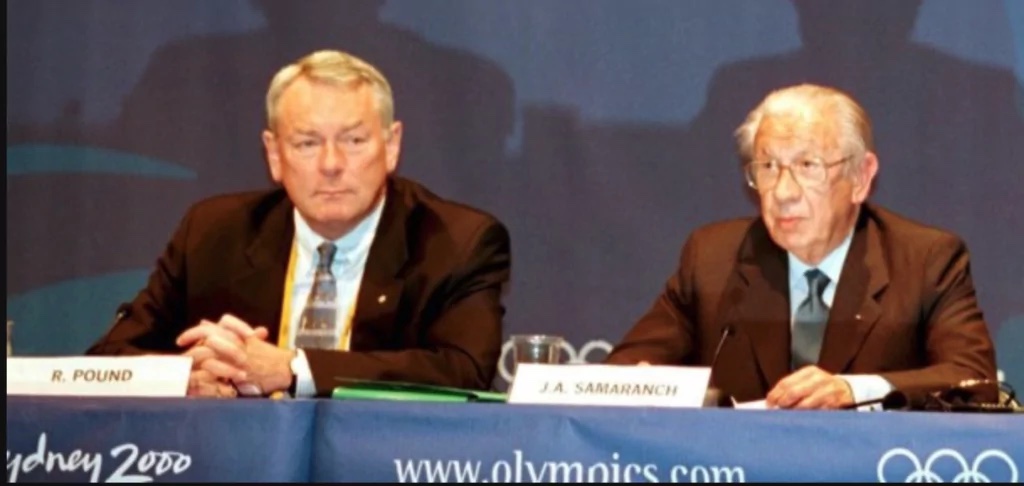Or how Samaranch set the cat among the pigeons (professionals in the Olympics)
At the 1981 olympic congress, J. Holt (we have already met him in this blog, when it was question of the proposal of G. Purdy of new scoring tables) who was the secretary general of IAAF stated clearly that athletes should be compensated in order to be able to train.
W. Daume was even more explicit : "If the Olympic Movement, expects the athletes to pursue excellence, it should not discriminate against them”. It is not clear whether this liberal attitude costed Daume the presidency of the IOC. Be that as it may in the 1980 election J.A. Samaranch was elected with 44 votes while Daume obtained just 6 (out of a total of 78).
During the 21 years of his presidency Samaranch put all his energy into transforming the IOC into a full-fledged corporate entity. The main danger were the professional sports and the fact that several olympic sports had developed professional circuits. The presidency of Samaranch was marred by bribery, bidding scandals, and a culture of corruption but one must recognise that it was him who brought the IOC back from the brink of bankruptcy.
Starting from 1981 the IOC worked towards more liberal eligibility rules removing existing anti-profiteering restrictions. Still football, ice-hockey and tennis continued to dissent with the IOC line. The FIFA for instance insisted that players from Europe and South America who participated in the World Cup be excluded from the olympics. The reason for this was to have the best national teams present only in the FIFA World Cup but the IOC members could see through the ruse. In fact the FIFA had started pushing for limiting the age of players in olympic teams to 23 removing any professional–amateur distinction. (As a consequence the football teams participating in the 1984 Olympics were composed mainly by professional players). Tennis had left the Olympics in 1924, but for Samaranch that was something unacceptable and he decided that tennis would return to the 1984 Olympics and to hell with amateurism. In fact at that time hardly anyone was caring about who was amateur and who was not.
For many years the IOC had lived with the fear that money would doom the Olympics to failure. But it was becoming apparent that the opposite was true. The fear of debt had grown strong to the point that cities, who would have liked to host the Olympics, abstained from even bidding for them. The Olympics was facing disaster. Samaranch understood that the only salvation would come from the commercialisation of the Olympic Games.
But even then there are traditions that die hard and even Daume, at the 1985 iOC session, argued in favour of a modernisation of the eligibility code but made clear that “open Olympics had to be avoided at all costs”. Brundage had left the presidency 13 years before but the IOC inertia was making progress really sluggish.
With the help of D. Pound, Samaranch obtained record-breaking television deals and lucrative commercial sponsorship arrangements. Pound pushed for open Olympics arguing that many things have changed since the birth of the modern Olympics and that “professionals had proved themselves as capable of observing the Olympic spirit and fair play as anyone”. The question of allowing professional tennis players in the 1988 Games was discussed in the 1987 session. Some members were still reluctant fearing that if the IOC legalised the breach of amateur status it would not be able in the future to reverse the vote to approve professionals. They were right, but they were also a minority. Professionals would come to the Olympics to stay. And the IOC shifted its efforts towards the enforcement of anti-doping rules.
In 1989 the IOC accepted the decision of the international basketball federation for an "open" olympic tournament. And while the professional tennis players were admitted in 1988 as a unique exception, the arrival of the US Dream Team in 1992 was heralded as one of the major moments in the Olympic history. In the meantime the olympic charter had purged the term amateur and Daume, as head of the Eligibility Committee, made sure that professional athletes could participate in the Olympics, provided their federation approved that.
As for Dick Pound, who had been a champion of professionalism in the Olympics, he lost his bidding for the presidency in 2001 when J. Rogue was elected with 59 votes, Pound obtaining 22 out of a total of 110.
This concludes the series I set out to write on the myth of amateurism promoted by de Coubertin and his successors. (But there will be at leat one more "bonus track" on some point I have not yet addressed).
Reading the story of amateurism, which is in good part the story of the IOC, one may wonder how the IOC continues to thrive. D. Chatziefstathiou, a de Coubertin specialist I have mentioned in my post "de Coubertin unmasked", points out that today, Olympism blends the twenty-first-century demand for elite sport, with multiculturalism, inoffensive moral dictates such as fair play and healthy competition, and a subtle dose of antiquity thrown into the mix. Those are the values that have substituted amateurism. As for the latter? Well, it was equal parts ideology, mythology, and nostalgia. And gone for good. And we will not miss it.



No comments:
Post a Comment